TWTW: The World This Week / Episode #89
Campus apocalypse…Elections 2024: Britain, India, Solomon Islands, Europe…Gaza, post-apocalypse…Xi hits the road…Macron frets…Olympic rêves…Iranian cartoonist Izadi on pollution
This weekly feature for Andelman Unleashed, continues on its mission to explore how the media of other nations are reporting and commenting on the United States, and how they are viewing the rest of the world.
How others see America
Is it a foretaste of the world to come? Much of the world’s media seems to feel that may be the case as the French daily Le Monde headlines “The war in Gaza sets American campuses on fire.”
New York correspondent Arnaud Leparmentier and Corinne Lesnes in San Francisco elaborate:
The protest is spreading in American universities. In New York, the police evacuated a pro-Palestinian student camp in Columbia, the epicenter of a movement which notably asks higher education institutions to renounce their investments in closely or distantly linked companies to the war in Gaza.
Suddenly, a support camp for Gaza sprang up at a university in Salt Lake City, in the heart of Utah. No demonstration relating to the Middle East had taken place until then on a campus known as one of the least politically active in the United States.
[These] protests—until now confined to the east of the country and to Austin, Texas, where it is severely repressed by the Republican governor, Greg Abbott—are now spreading throughout the country. Its promoters evoke the Vietnam War or the fight against apartheid, but the mobilization is amplified by social networks. The police have made “only” 1,500 arrests on around thirty campuses…
Indeed, the great Swiss cartoonist Patrick Chappatte, co-founder of Cartooning for Peace, drawing for the Geneva daily Le Temps, believes Netanyahu has the solution as he whispers in Joe Biden’s ear, “I know just how to deal with these Hamas schools.”
Solveig Godeluck, the multi-talented U.S. correspondent for the French financial daily Les Echos pointed out quite presciently, along with her most perceptive photos:
Faced with the pro-Gaza protests, university presidents know that they must show their firmness so as not to fall victim to accusations of tolerance towards anti-Semitism, and so as not to be forced to resign like the presidents of Harvard and the University of Pennsylvania. Especially since Republican elected officials are throwing fuel on the fire to destabilize the leaders of these progressive bastions, and at the same time criticize the inaction of Democratic President Joe Biden.
The students are demanding that their university stop investing in military equipment manufacturers or companies that profit from the territories occupied by Israel, such as Airbnb. The blacklist drawn up by the Columbia protesters is long: Microsoft, Amazon, Alphabet, BlackRock, Hyundai, Caterpillar, Lockheed Martin, Boeing, Barclays, Volvo.
Contrasts are repeatedly made to America’s last serious campus uprisings, chronicled here in Unleashed Memoir #3—at Columbia, this time in 1968.
Unlike 1968 when Columbia, like most American universities, were far different from today’s multi-national, polyglot institutions of the world, today any number of nations and their youths have been sucked in—and media back home have hardly failed to take notice. As South China Morning Post correspondent Khushboo Razdan, herself a graduate of Columbia Journalism School, reported:
“I have to cover my face with scarves even when I donate pillows and bedsheets to the campers,” a Chinese student at Columbia University in New York told the Post this week.
The 29-year-old, who asked only to be identified as “Lu”, acknowledged taking part in some of the pro-Palestinian demonstrations that have brought the hallowed campus to a standstill and triggered a crisis for the institution not seen since the Vietnam war.
And compared with other international students who have joined the protests roiling the Ivy League school, Lu believed the “risk levels” were different for her as a Chinese student amid heightened Sino-American tensions. “It is already precarious to be Chinese in the US in these times.”
The Israeli daily Haaretz, which has been watching the events on American campuses closely, wondered about the great German-Jewish philosopher Karl Popper, “who fled Nazi Europe and coined the term the 'Open Society,' warning of the dangers of both tolerance–and intolerance. At what point would the philosopher, in his own words, have considered pro-Hamas slogans and police violence on U.S. campuses as 'criminal incitement to intolerance and persecution?'”
As commentator Robert Zaretsky continued:
Popper allowed that an open society, at least in times of peace and strength, can "tolerate its lunatic fringe, that is to say, those who preach intolerance and who, at the same time, accuse the tolerant of hypocrisy, because they are not prepared to tolerate every aggressive form of intolerance." [But] our time is not peaceful and our society is not strong…
Meanwhile, in London, The Times found dangerous signs of a replication of America’s unrest:
Pro-Palestinian groups are setting up protest camps at universities across Britain in an effort to replicate the disorder on campuses in the United States.
Organisers said that the actions had been inspired by those in the US, where weeks of fractious demonstrations against Israel’s war in Gaza have divided campuses. More camps are due to be set up at universities including Lancaster, Swansea and Edinburgh. One group said the protests were loosely co-ordinated.
And in the Middle East, The Economist finds more signs of expansion:
University protests about Gaza spread to the Middle East. But Arab students are looking to America for inspiration…
Compared with the demonstrations about the war in Gaza that have rocked the campuses of American universities, those at Arab institutions have been more limited. That could be changing.
Elections 2024: Britain, India, Solomon Islands…& still Europe
We ordinarily exclude local elections from the broad tapestry of national votes we chronicle from around the world, but this last week’s elections in Britain are too good an indicator of the potential fortunes of Prime Minister Rishi Sunak and his Tory Party. And as The Economist put it:
Britain’s ruling Conservatives fared disastrously, losing around 100 of the seats they were defending. The Tories also lost a parliamentary by-election in Blackpool South to Labour on a 26% swing. The general-election prospects of Rishi Sunak look increasingly dim.
The Spectator was even more graphic:
Tory losses and a red wave [as] 103 English councils went to the polls with ten mayoral races and dozens of police and crime commissioner positions up for grabs too….
….had the whole country gone to the polls Labour would win with a nine point margin. That's a record equalling low for the Tories but with Labour not extending their lead on a year ago.
By Sunday morning, it also became clear that London’s Labour Party mayor Sadiq Khan, the first Muslim ever elected there, won a record third term in office.
In India, the extraordinary six-week election in the world's most populous country and at least for the moment the largest democracy with some 969 million voters, balloting still has a month more to run. And Prime Minister Nahendra Modi, while little concerned over an all but certain re-election victory, has to be a bit troubled by more than the political temperature. The Hindustan Times newspaper reported:
Record-breaking heatwave affects voter turnout. Eastern India faces its hottest April on record, with a scorching heatwave claiming nine lives. Analysts link low voter turnout in the ongoing Lok Sabha Election 2024 to extreme weather conditions.
Phase 3 (of 7 phases) ends May 7.
Meanwhile, Modi continues campaigning, as the Hindustan Times continues, “Modi has arrived in Kolkata, Wes Bengal. He will address four public meetings across the state.” Campaigning Trump style.
Andelman Unleashed, in line with its pledge to chronicle every national election will follow the process throughout India’s voting and onward to the final results due June 4. Five days later we should also have the results for Europe's new parliament.
But in the Solomon Islands, as Nic Fildes reported in the Financial Times:
[Voters] picked former top diplomat Jeremiah Manele as its next prime minister, in what analysts said could herald a shift towards the Pacific island country’s traditional western allies after it had pursued closer ties with China. Manele, a former foreign minister, in 2022 signed a security with Beijing that alarmed other Pacific powers, including the US and Australia.
The Solomon Islands has been a geopolitical flashpoint in the Indo-Pacific over the past five years, as China’s growing influence has rattled the region’s traditional security partners. Manele, now as prime minister, is expected to maintain ties with China, but analysts suggested he could be more conciliatory towards the west than his predecessor, the charismatic outgoing premier, Manasseh Sogavare, whose policy of forging closer security and commercial links with Beijing roiled the region’s traditional power alignment.
Indeed, the US State Department exulted:
We congratulate the people of Solomon Islands for making their voices heard, and we applaud the many officials and volunteers, especially from the Solomon Islands Electoral Commission and the Royal Solomon Islands Police Force, whose dedication made the free and fair elections possible. We look forward to working with Prime Minister Jeremiah Manele to further strengthen the U.S.-Solomon Islands relationship and move our nations toward a better future.
Finally, Europe is drawing ever closer to what is shaping up as a potentially seismic shift in the June pan-European elections where, still, ‘rien n’est joué’—nothing is decided (yet), or as David Carretta and Christain Spillmann of our sister SubStack La Matinale Européene put it:
The latest compilation of voting intentions in the 27 EU countries confirms the rise of far-right parties, the maintenance of the European People's Party family as the leading group, good resistance from the Socialists, an upgrading of the Liberals, a fall of the Ecologists and the radical left. But these trends can be reversed if voters decide that the European Union is worth saving.
The far right and sovereigntist parties dominate political life in France, Italy, Poland and Hungary and are shaking up the major parties in Germany and Spain. They don't like the European Union. After Brexit and its consequences for the United Kingdom, no one is talking about leaving anymore. But everyone wants to remodel, even dismantle it. “We can become the dominant forces,” proclaims Hungarian Prime Minister Viktor Orban, who dreams of “bringing together all the conservative, sovereigntist and Christian national forces.” His friend, the head of the Italian government Giorgia Meloni, wants to “return the left to the 'opposition.’
The National Rally of Marine Le Pen is the first party in France. Polls credit her with 25 of the country's 81 elected Members of European Parliament [MEPs]. Fratelli d'Italia, Giorgia Meloni's party, could send [to Brussels] 23 of Italy's 76 MEPs; Law and Justice (PiS) 17 of 53 Polish MEPs; Victor Orban's Fidesz 11 of 21 Hungarian MEPs; AfD 16 of 96 German MEPs; and Vox 7 of the 61 Spanish MEPs.
How others see the World
After the war?
Le Monde believes it has a very good sense of “how Israel will reconfigure the Gaza strip” after the war ends. And it is utterly chilling….
A five-person team has produced a sweeping roadmap for the long-term re-configuration of Gaza that would appear to preclude any possible move toward sovereignty or even a semblance of a two-state solution:
In nearly seven months of war, the Israeli army has reshaped Gaza according to its needs. It is razing buildings in a “security zone” approximately 1 kilometer around its entire border, threatening to permanently deprive the narrow coastal strip of 16% of its territory, particularly agricultural land, according to satellite data analyzed by Le Monde.
It has forced hundreds of thousands of Gazans to leave the north of the enclave and consolidated a militarized road which prevents their return, while limiting the passage of humanitarian aid.
The army carries out raids from two forward bases set up on this corridor. It is also building new structures on the coast, supposed to secure the delivery of aid by sea, promised by its American ally for the beginning of May. “Israel presents these structures as temporary, but they represent faits accomplis which can last for a long time,” fears a Western diplomat.
The Israeli right aims to make the ruined metropolis of Gaza a depopulated buffer zone in the North, or to recolonize it….However, all components of Israel's ruling coalition demand long-term "freedom of action" for the army in Gaza. They agree on the fact that a “stabilization” phase will have to continue for many years after the war, requiring regular raids against Hamas and the armed brigades of Gaza.
And if there was any question of Joe Biden offering any restraint on Prime Minister Netanyahu’s most violent plans, Turkish cartoonist Ahmed Rahma has a different point of view….
Meanwhile, another perspective…
As I wrote this past week in my CNN column my wife Pamela and I are giving serious consideration to moving to France. Much depends on the outcome of America’s elections this November, which we will continue to follow from the perspective of the world beyond America’s shores. Meanwhile, here’s my current perspective, followed by my thoughts expressed on Abby Phillip’s admirable show on CNN television that same evening. Just click on the respective image!
And on television !
Peter Baker of The New York Times later riffed on this same theme, with a nod to the fears sweeping Washington …
David A. Andelman, 79, a longtime journalist who already lives part-time in France, wrote on CNN’s website this past week that he and his wife might move there full-time if Mr. Trump wins and had “found a growing sentiment that we are hardly alone.” The day that his column posted online, he said, his real estate broker in France received 45 calls from Americans looking to do the same.
The thoughts of the entire Unleashed family are always appreciated. Join the chat !
In Paris, a date at the bistro
Our favorite Paris bistro is La Rotonde on Montparnasse, which happens to be the fave of President Emmanuel Macron. So it was not a huge surprise when he and his wife wanted to take the Chancellor of Germany Olaf Scholz and his spouse for a quiet, unobtrusive dinner, avoiding the pomp and circumstance of the Elysée Palace, not to mention the prying eyes of the Elysée press corps, they decided to sneak away to La Rotonde.
As for the agenda, it was hardly discrete. After all, the two were seeking to warm up what the German press had taken to calling a “dangerous ice age.” Let’s let Politico Europe in Brussels explain:
Xi is headed to France [on Sunday] before visiting Serbia and Hungary. It’s no secret that Paris and Berlin don’t see eye to eye on how to approach Beijing.
Scholz’s visit to China last month prompted criticism that he failed to raise the threat of Beijing-subsidized goods for the European economy and skipped over China’s provision of dual-use goods to Russia for its war against Ukraine.
Now they have even more to argue about: The European Commission is moving ahead with its probe into Chinese state subsidies for electric vehicles, with provisional measures—tariffs or quotas—potentially to be imposed before the summer break. Adding to that, EU investigators have found that all three Chinese electric vehicle-makers targeted by the probe were “non-cooperative.”
As Carretta and Spillmann of La Matinale Européene suggested, the stakes could be especially high, both for Macron and for European Commission President Ursula von der Leyen, who Macron invited to tag along:
“Some analysts suspect Mr. Macron of wanting to do business with China at the expense of Europeans. What emerges from the meetings with Xi at the Élysée and in the Hautes Pyrénées (Macron will take the Chinese president to the lands of his childhood) will likely determine the level of seriousness of the EU in its response to the threat posed by China. With a very concrete test: Ukraine. Faced with Beijing's growing support for the Russian war effort, the Biden administration is increasing pressure on Europeans to adopt a firmer stance towards China.
Beijing helps Moscow circumvent Western sanctions and supports the war economy. “China is the largest supplier of machinery, microelectronics, nitrocellulose, which are essential for the production of munitions and missile propellants, and other dual-use products that Moscow uses to strengthen its defense industrial base” , explained US Secretary of State Antony Blinken, who visited Beijing last week….The EU, on the other hand, has been much more timid.
French cartoonist KAK (Patrick Lamassoure), president of Cartooning for Peace, imagined for the website of Radio France a very smug Xi observing Europe tying itself in knots while UvdL presides …
But Macron has hardly been timid about the continent’s dilemmas. In a remarkably candid interview with The Economist, he detailed an “urgent message for Europe…a dark and prophetic warning…his apocalyptic vision.” And with a stark warning on the magazine’s cover:
Inside, The Economist begins:
Europe should not rule out putting troops in Ukraine. This elicited horror and fury from some of his allies, but [Macron] insists their wariness will only encourage Russia to press on: “We have undoubtedly been too hesitant by defining the limits of our action to someone who no longer has any and who is the aggressor.”
Mr Macron is adamant that, whoever is in the White House in 2025, Europe must shake off its decades-long military dependence on America and with it the head-in-the-sand reluctance to take hard power seriously….He calls for an “existential” debate to take place within months. Bringing in non-EU countries like Britain and Norway would create a new framework for European defence that puts less of a burden on America. He is willing to discuss extending the protection afforded by France’s nuclear weapons, which would dramatically break from Gaullist orthodoxy and transform France’s relations with the rest of Europe….He wants a profound change to the way Europe works.
Don't forget the Olympics….
If you're coming to Paris in July and August, don't count on English. As Japan Today reported, there's a move in France for the natives to do their best to avoid "the creeping use of" anything but the local vernacular….
Having long battled the creeping use of English in advertising, music and film, French MPs have declared a new struggle: keeping their home Olympics this year free from anglicisms. In a resolution adopted Thursday, the lower house of parliament urged organizers of the 2024 Paris Games, as well as athletes, trainers and journalists to use French as much as possible.
Annie Genevard, the conservative sponsor of the resolution, expressed alarm to fellow MPs that "the Olympic Games reflect the loss of influence of our language."
"The fight for the French language ... is never finished, even in the most official spheres," Genevard added…."Let's hope that 'planche a roulettes' replaces skateboard and 'rouleau du cap' point break (a surfing term), but I have my doubts."
Moreover, the Macron government is hardly on board….
"You can't overlook the fact that many global sports events that are broadcast globally have chosen to use English for their communication, in their titles, slogans and advertising," Culture Minister Rachida Dati told parliament.
The Paris Games have already been embroiled in a row about language after rumors that Franco-Malian R&B star Aya Nakamura was set to sing during the opening ceremony on July 26.
The mega-star, the most streamed French artist in the world, mixes French, Arabic and words from West African dialects in her songs such as "Djadja". She was accused of "vulgarity" and mangling the French language by far-right leader Marine Le Pen in a series of highly personal attacks that were denounced as racist by Dati at the time.
"France is not and will never be 'Djadja'," far-right MP Julien Odoul told Parliament on Thursday.
With just 86 days to go to the opening ceremonies on the Seine. Andelman Unleashed [where French is also spoken] arrives in Paris on July 17. Lots to chronicle….Can't wait!
Finally, there’s …. Izadi
The great Iranian cartoonist Izadi imagines a world where a mother must stretch herself to the limits to find breathable air for her beloved child.
Mohsen Izadi is an Iranian cartoonist born in 1983 in Abadan. From 2005, he drew for a broad spectrum of his nation’s media: Jame Jam, Hamshahri, Iran. Ghanon, Hamshahri Bacheha, Khat Khati, Docharkhe, Nadoshan, Takhte Siah, and Donyaye Riaziat. He has published several books: Who's Afraid of the Internet, Game Alley, and How to Become an Actor. Forced into exile by the Iranian government’s attitude toward cartoonists in the nation’s tightly controlled media, he currently plies his art in Sweden and is a member of the extraordinary collective, Cartooning for Peace.
Here's how Izadi imagines himself:




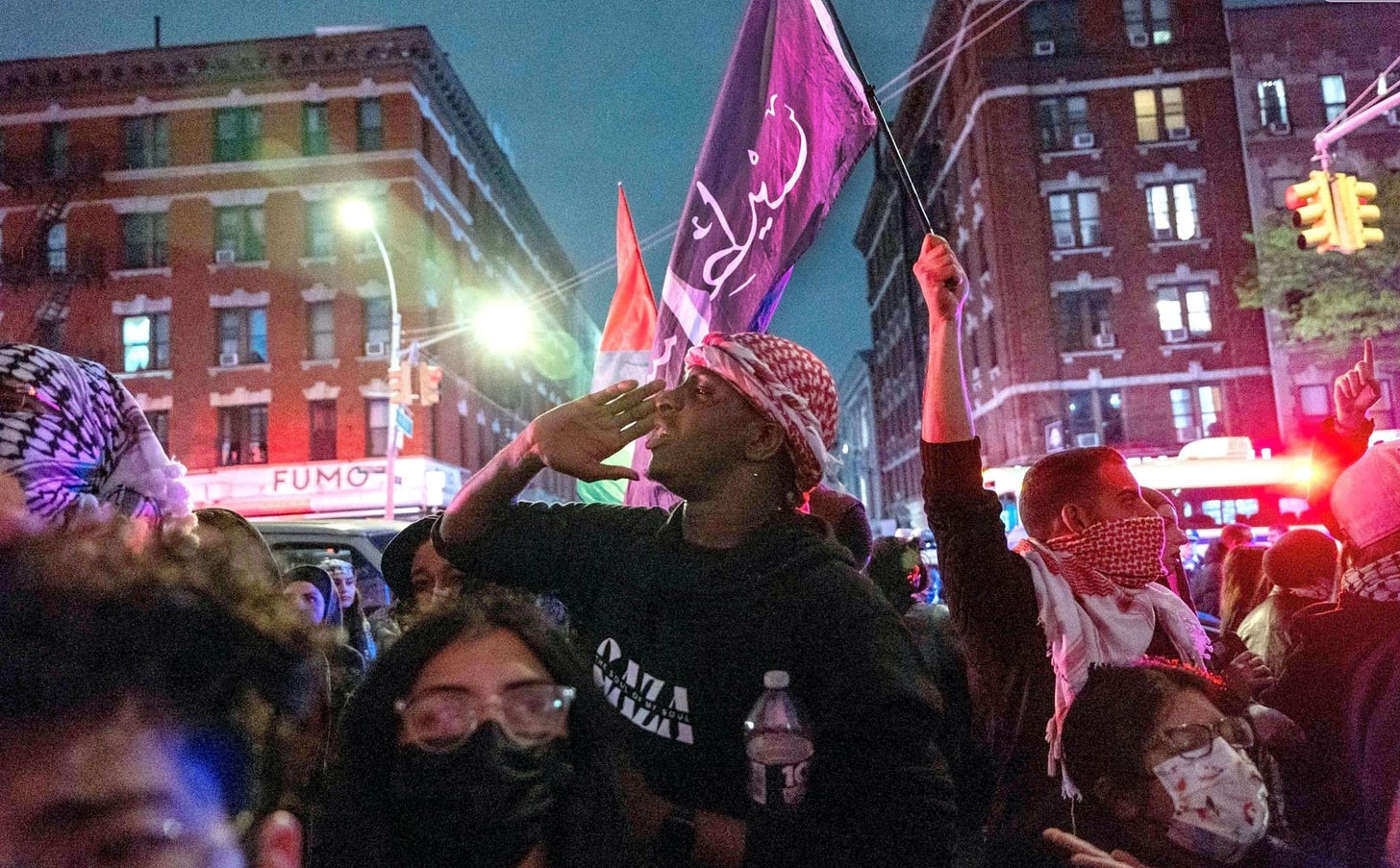

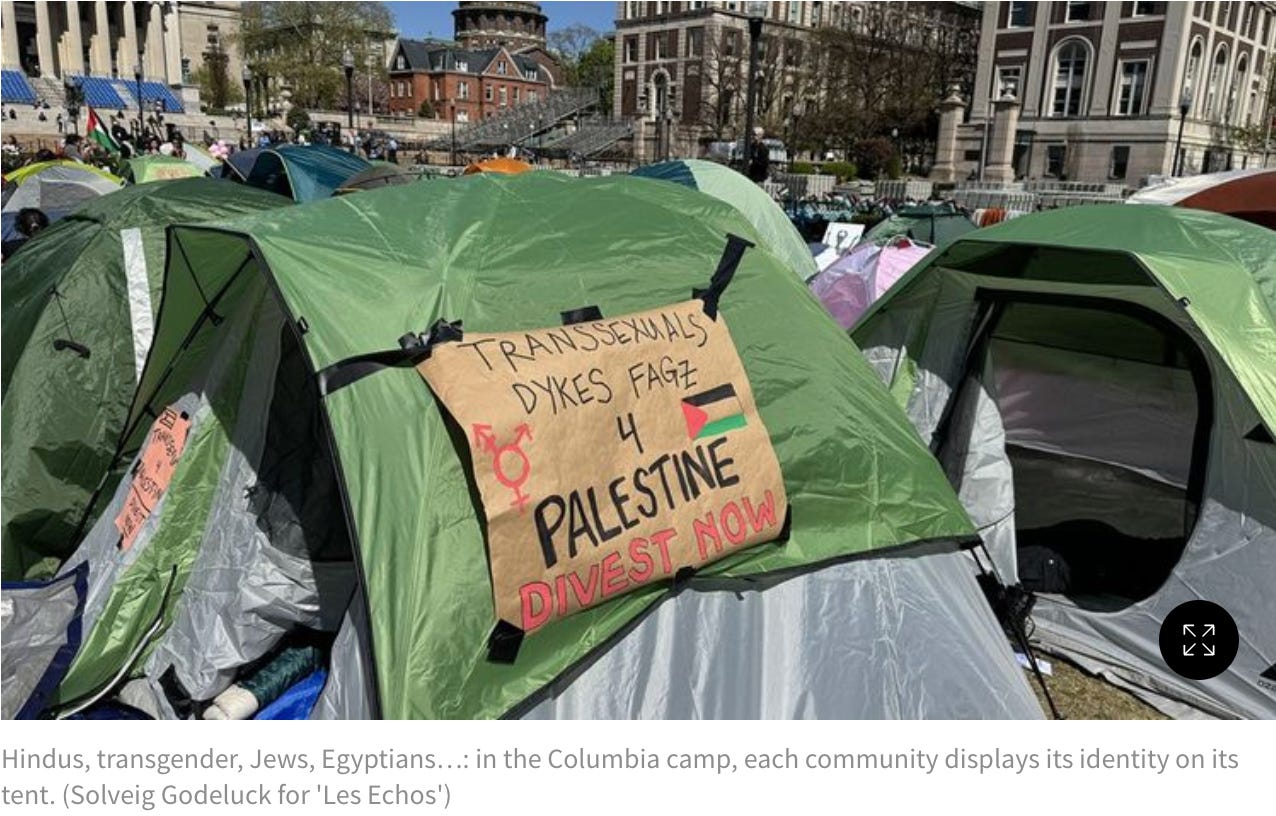
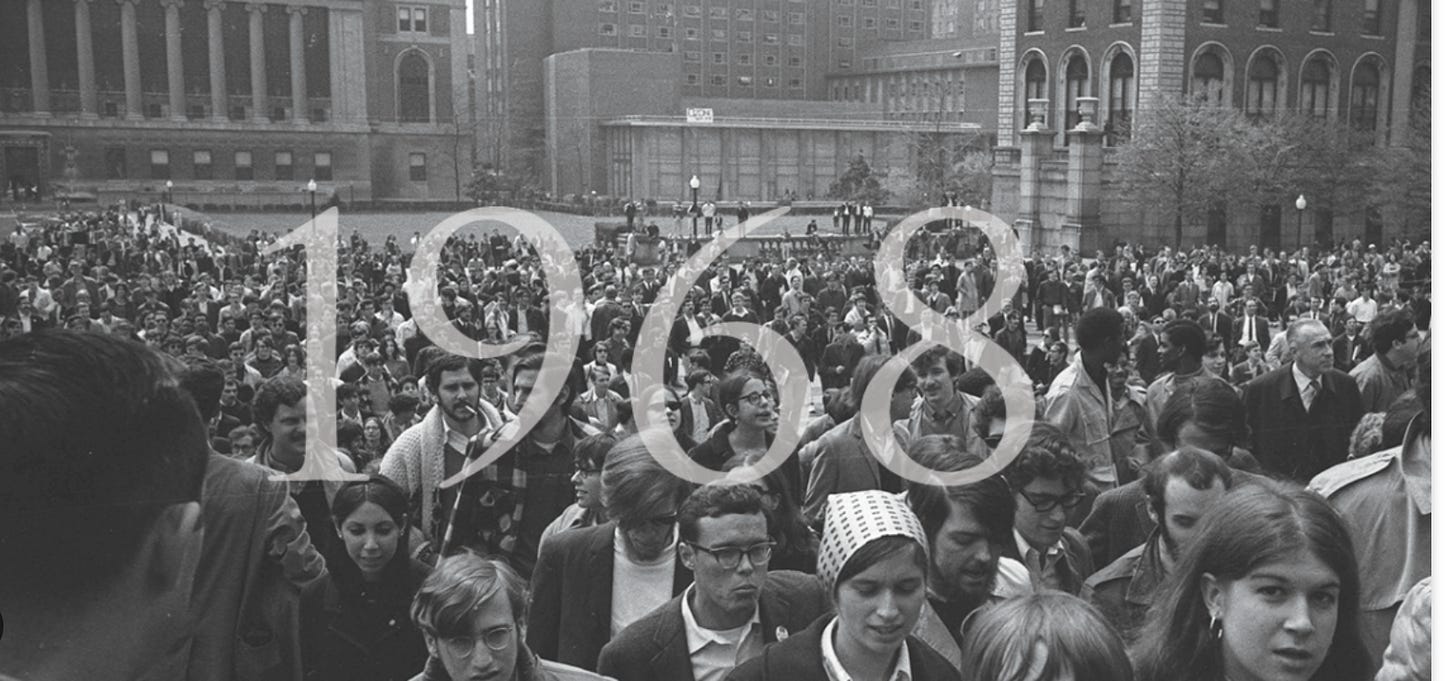

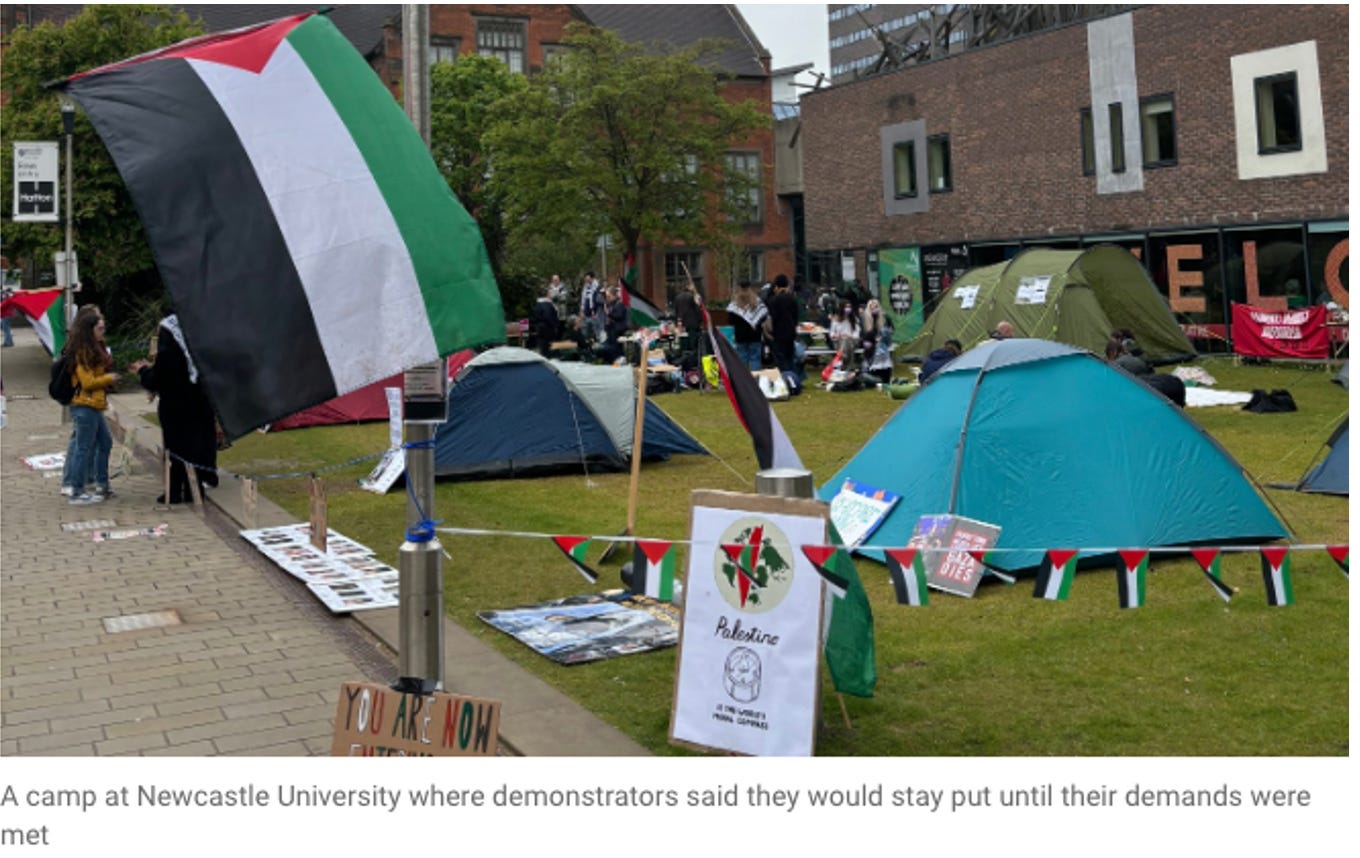

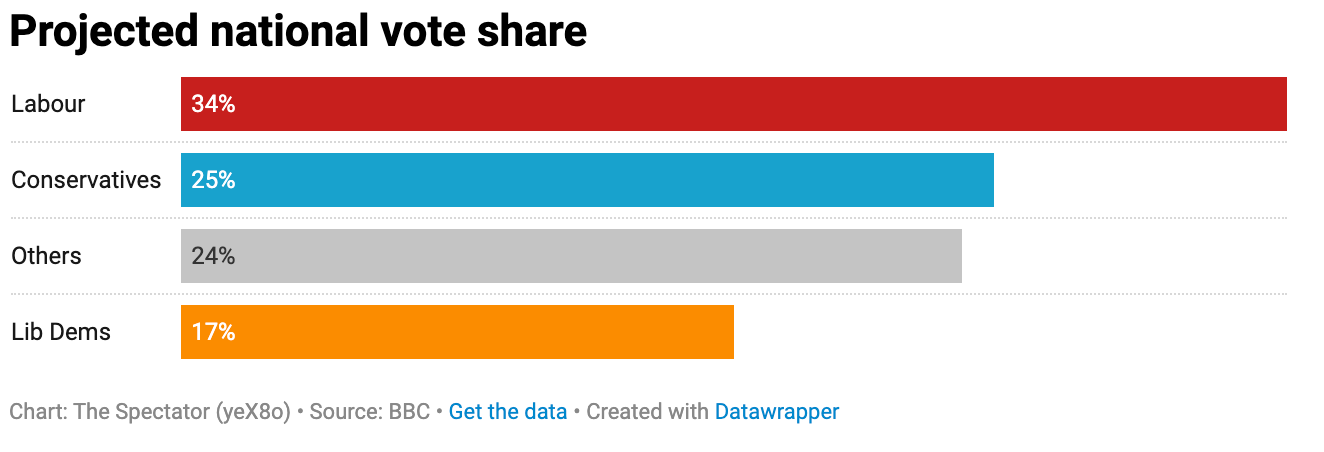
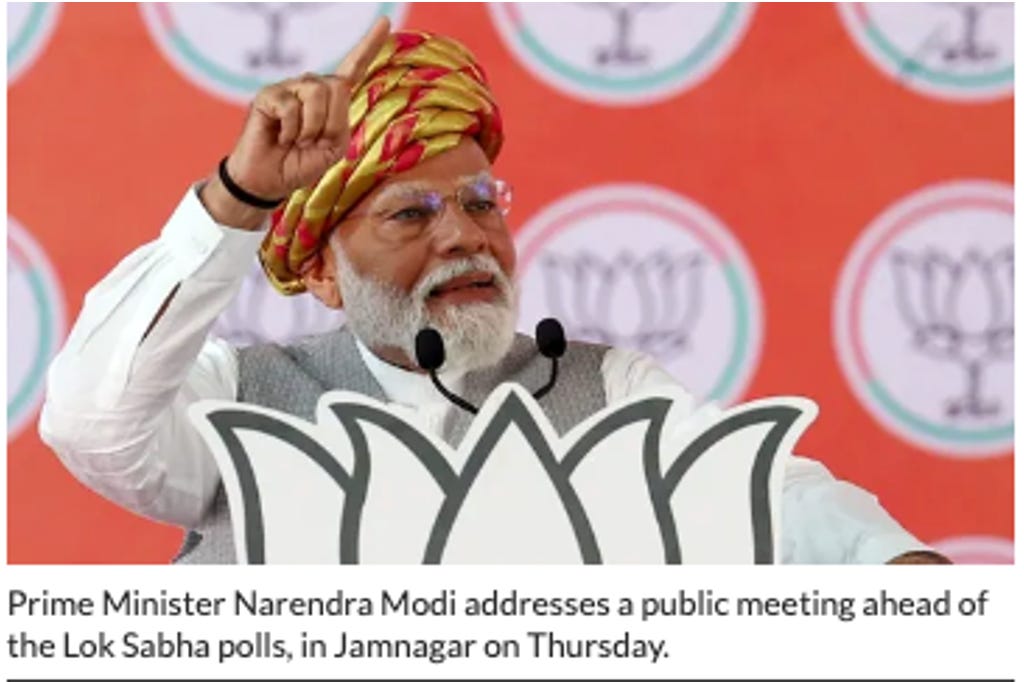
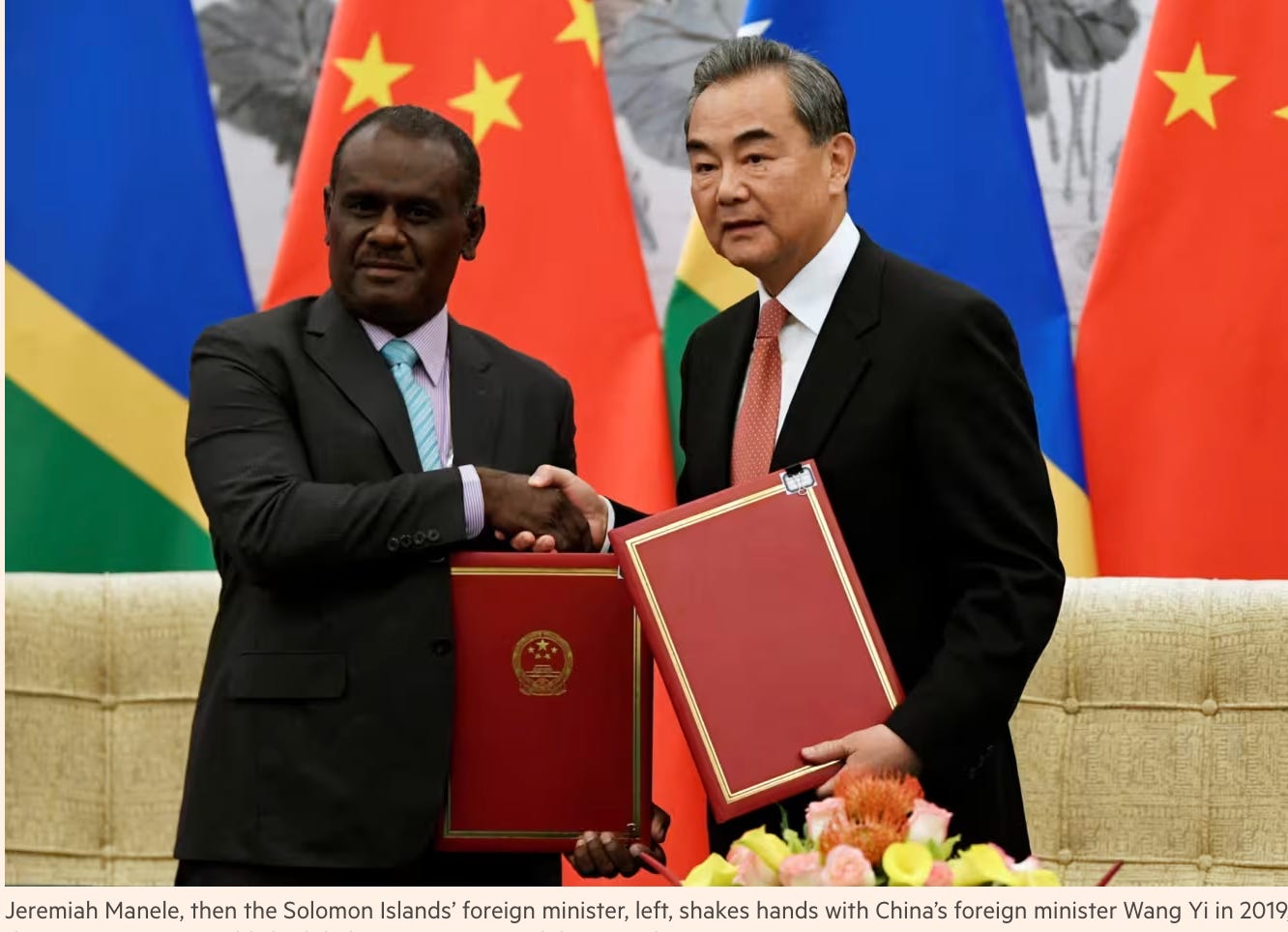

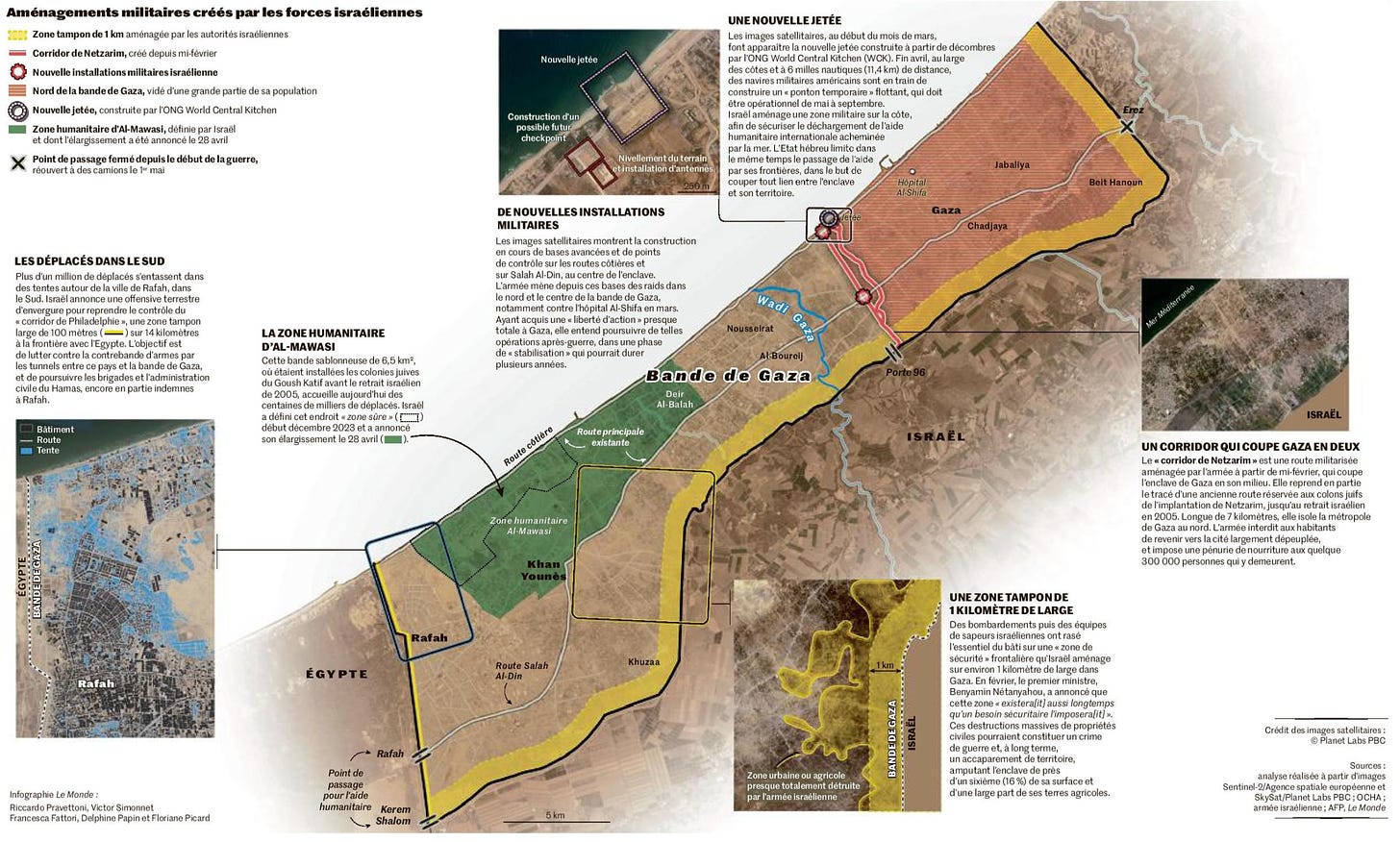






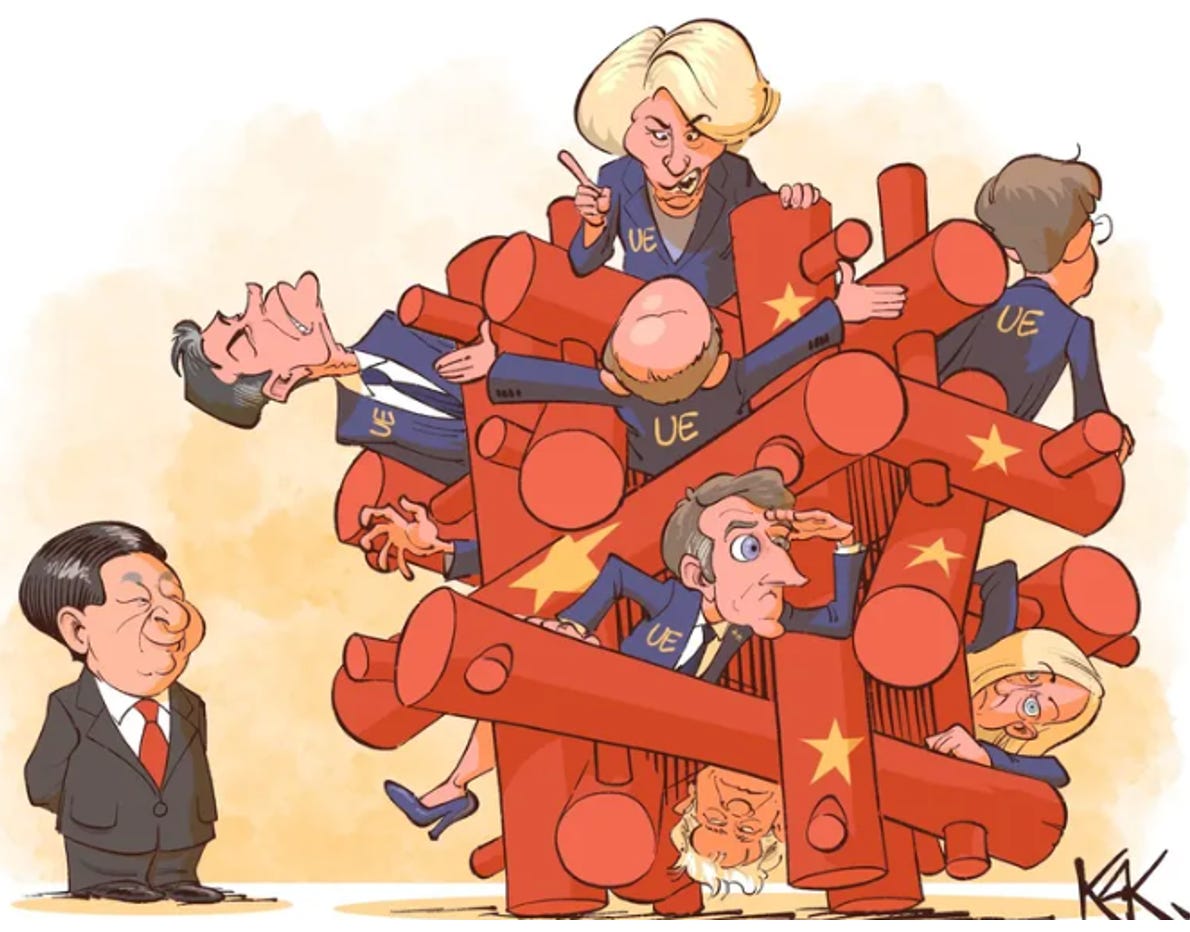
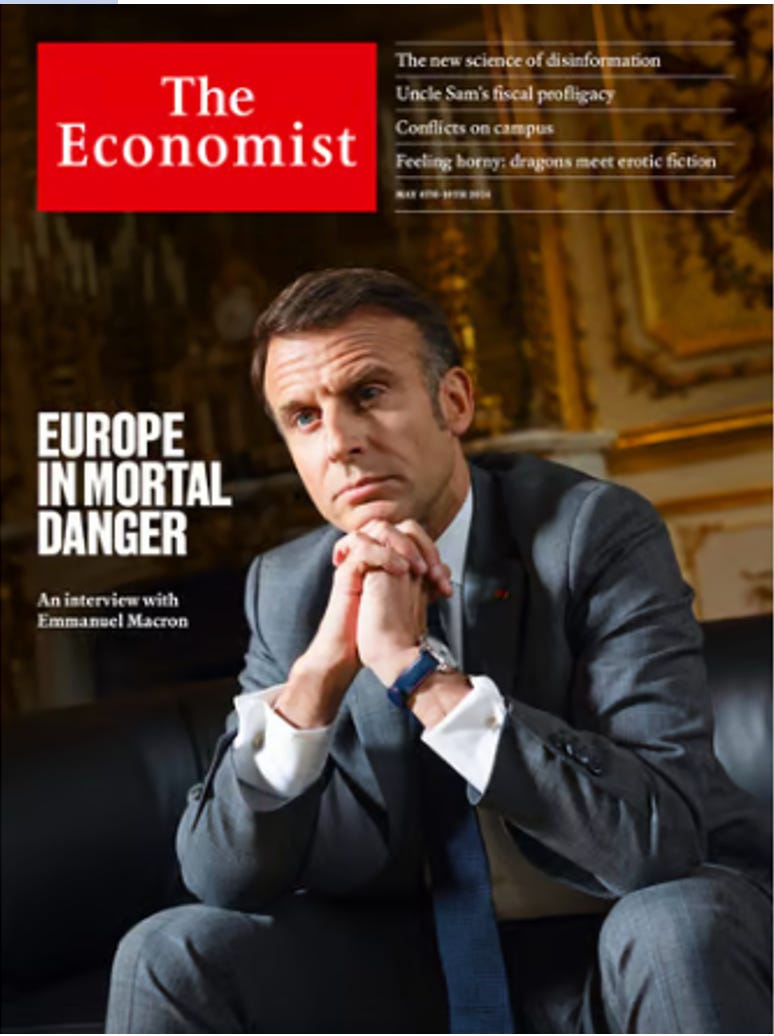
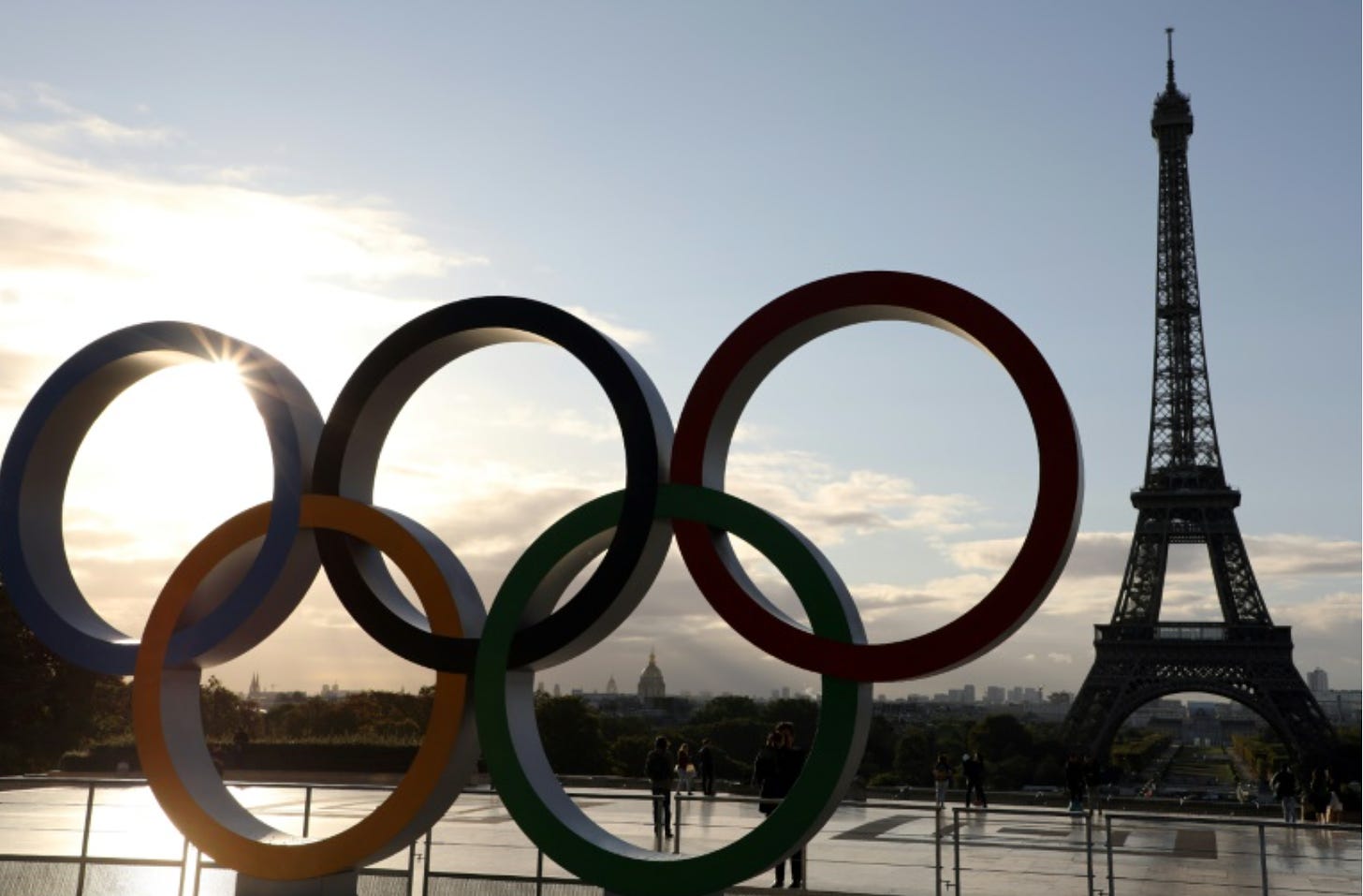

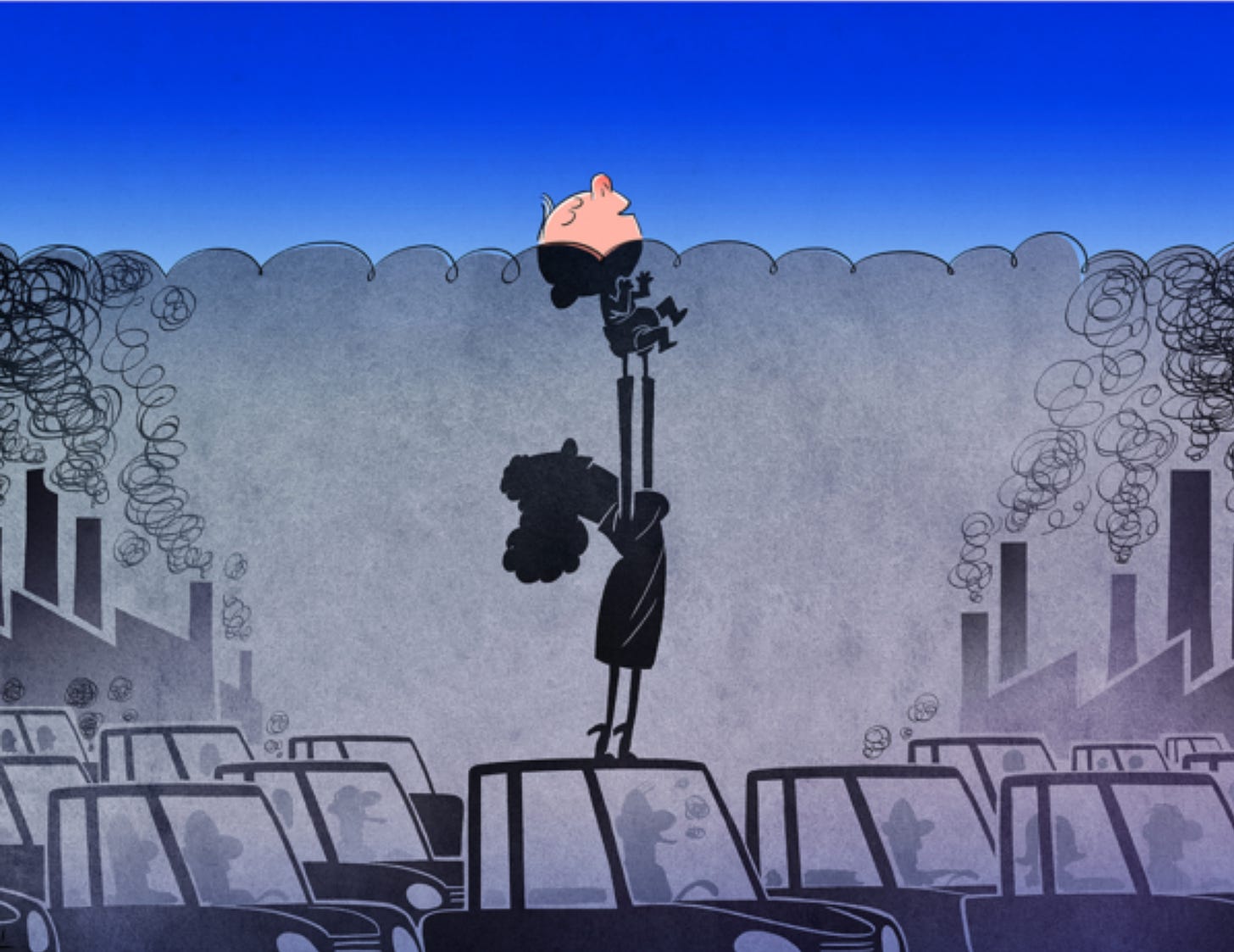

We’ve got OUR room already !!
🙄👀
I am just so delighted to have such an attentive and informed reader ... that in itself is truly inspiring!
I am sharing this as a note in hopes that more will discover your thoughts!